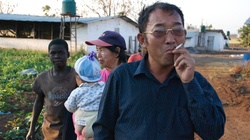
Mr. Liu on his farm in Zambia, from the film When China met Africa
Chinese firms buy, lease far less African farmland than thought - book
By Chris Arsenault
TORONTO (Thomson Reuters Foundation) - Contrary to reports that Chinese firms were buying or leasing millions of hectares of prime African farmland, Chinese investors have acquired only about 240,000 hectares, according to a book published on Monday.
Deborah Brautigam, director of the China Africa Research Initiative at Johns Hopkins University, analysed media reports that Chinese investors had leased up to six million hectares of farmland across Africa for her book "Will Africa Feed China?"
Reported deals included one that Chinese investors had bought three million hectares of prime farmland in Democratic Republic of Congo for palm oil plantations, and another that Chinese firms had leased two million hectares in Zambia for a biofuels project.
ADVERTISING
After following up the announcements, and visiting the sites of some of the 60 large-scale deals announced from 1987 to 2014, Brautigam found that only 38 of the acquisitions had led to some land being transferred.
"As we looked at these cases, we found that most never happened," Brautigam told the Thomson Reuters Foundation. "The original visions (of investors and African governments) were wildly optimistic."
Her research showed that by the end of 2014, Chinese investors had acquired about 240,000 ha of farmland in Africa, Brautigam said.
Deals often stalled because overly ambitious investors saw what they thought was unoccupied land, and politicians seeking economic growth welcomed their unrealistic plans, she said.
But when companies realized the poor state of infrastructure in countries like the Democratic Republic of Congo or Ethiopia, and the fact that small farmers held customary tenure over land they thought they were leasing, most firms either massively reduced their plans or pulled out entirely, she said.
"There were protests in some countries (over large-scale Chinese investment plans)," she said. "But in most countries (investments) didn't get to a point where anything happened, so protests didn't happen either."
Last year, China imported $2.9 billion worth of agricultural products from sub-Saharan Africa, she said, up from $2.7 billion in 2013.
Most deals which actually produced food involved the privatisation of state agricultural assets and plantations, rather than new land being cleared for production, she said.
Mozambique, Cameroon and Ethiopia saw some of the largest actual Chinese investments, mostly in sugar and rubber plantations, she added.
Rather than buying land outright, or leasing huge African tracts for long periods, many Chinese investors have shifted to a form of contract farming where companies provide small growers with seeds, training and a guaranteed market in exchange for their products, she said.













